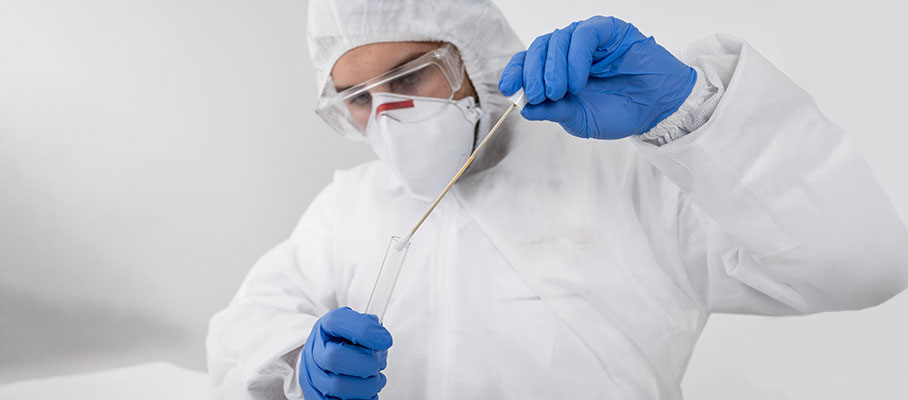Health Test
Creatinine Test: Purpose, Preparation, Normal Range and Results

Table of Contents
- What Is a Creatinine Test?
- How Does a Creatinine Test Work?
- Why Is the Creatinine Test Done?
- What Does a Creatinine Test Measure?
- Normal Creatinine Levels and Variations
- Causes of Abnormal Creatinine Levels
- Creatinine Test vs. Creatinine Clearance Test
- How to Prepare for a Creatinine Test
- What Happens During the Creatinine Test?
- Risks and Side Effects of the Creatinine Test
- How Are Creatinine Test Results Interpreted?
- Post-Test Care and Next Steps
- Conclusion
- FAQs
- References
What Is a Creatinine Test?
A creatinine test measures the level of creatinine, a waste product created when your muscles break down a compound called creatine during normal daily activities. Your kidneys filter creatinine from your blood and eliminate it through urine, making it a useful indicator of kidney function when interpreted alongside other markers like eGFR.
When kidney function declines, creatinine levels in your blood rise because your kidneys cannot filter it effectively. This makes creatinine testing helpful in detecting conditions like chronic kidney disease and acute kidney injury when used with other kidney function tests.
How Does a Creatinine Test Work?
The creatinine kidney test works by comparing the amount of creatinine in your blood to expected normal levels. For a serum creatinine test, a healthcare professional draws blood from a vein in your arm using a small needle. The entire process takes just a few minutes and causes minimal discomfort.
A creatinine urine test requires collecting urine samples over a specific period, often 24 hours. This comprehensive collection helps determine how effectively your kidneys filter creatinine from your blood. The laboratory then analyses these samples to calculate your creatinine clearance rate.
The creatinine clearance test combines both blood and urine measurements, comparing creatinine levels in your blood with the amount eliminated in your urine. This comparison helps calculate your estimated glomerular filtration rate (eGFR), a key measure of kidney function that indicates how well your kidneys filter waste from your blood.
Why Is the Creatinine Test Done?
A creatinine test serves as a routine test for individuals with risk factors for kidney disease or as part of broader health check-ups when clinically indicated or those with risk factors for kidney disease. The test becomes particularly crucial if you have diabetes, as this condition significantly increases your risk of developing chronic kidney disease. High blood sugar levels can damage the small blood vessels in your kidneys over time, making regular monitoring essential.
Your doctor might also order a creatinine kidney test if you experience symptoms suggesting kidney problems. These symptoms include persistent fatigue, swelling in your feet or ankles, changes in urination patterns, or unexplained nausea.
Additionally, doctors also use this test to monitor existing kidney conditions, track treatment effectiveness, and detect potential medication side effects that might harm your kidneys.
What Does a Creatinine Test Measure?
The creatinine test measures the concentration of the creatinine waste product in your blood or urine. Normal, healthy kidneys efficiently filter creatinine from your blood, maintaining stable levels. When kidney function declines, creatinine accumulates in your blood, causing levels to rise.
Blood creatinine levels reflect your kidneys' current filtering ability. Higher levels suggest reduced kidney function, while lower levels might indicate decreased muscle mass or other health conditions. The creatinine urine test measures how much creatinine your kidneys eliminate over time, helping calculate creatinine clearance, which offers additional insight into kidney filtration.
Normal Creatinine Levels and Variations
Normal values vary based on several factors:
• Adult Men: 0.7–1.3 mg/dL
• Adult Women: Approximately 0.6–1.0 mg/dL (ranges vary by lab)
Important Considerations:
• Age: Children typically have lower levels than adults.
• Muscle mass: People with more muscle mass naturally have higher creatinine levels.
• Pregnancy: Levels often decrease due to increased kidney filtration.
• Race: Some ethnic groups may have naturally higher baseline levels.
• Athletes and bodybuilders: Often have higher normal ranges.
• People with muscle-wasting conditions: May have lower levels.
• Dehydration: Can temporarily increase creatinine levels.
Causes of Abnormal Creatinine Levels
High creatinine levels often indicate reduced kidney function, but other causes include dehydration, some medications (such as NSAIDs) can raise creatinine levels; ACE inhibitors may cause a mild rise but are generally not harmful., high-protein diets, and intense exercise. Conditions like diabetes can damage kidney blood vessels over time, leading to elevated creatinine levels and potential chronic kidney disease.
Kidney infections (pyelonephritis) can cause temporary decline in kidney function, which may elevate creatinine levels, affecting creatinine clearance. Acute kidney injury from infections, medications, or reduced blood flow to the kidneys can cause rapid creatinine elevation requiring immediate medical attention. Low creatinine levels are less common but can result from severe malnutrition, muscle-wasting diseases, or pregnancy.
Creatinine Test vs. Creatinine Clearance Test
Standard Creatinine Test:
- Measures creatinine in blood or urine samples
- Quick, simple procedure
- Provides a snapshot of current creatinine levels
- Less accurate for people with unusual muscle mass
Creatinine Clearance Test:
- Requires 24-hour urine collection plus blood sample
- Calculates how much creatinine the kidneys clear from the blood
- Provides a more detailed estimate of filtration but may overestimate GFR due to tubular secretion of creatinine
- Better accuracy for people with unusual muscle mass
How to Prepare for a Creatinine Test
- Inform your healthcare provider about all medications, supplements, and herbal remedies you're taking, as some can affect results.
- Avoid strenuous exercise for 24 hours before the test, as intense physical activity can temporarily raise creatinine levels.
- Follow fasting instructions if your doctor recommends them, though most creatinine tests don't require fasting.
- Collect urine samples carefully if undergoing a creatinine urine test, following laboratory instructions precisely.
- Discuss your medical history, including any kidney problems, diabetes, or muscle disorders.
What Happens During the Creatinine Test?
The creatinine blood test procedure is straightforward and typically takes less than five minutes. A healthcare professional will clean your skin with an antiseptic, insert a small needle into a vein in your arm, and collect blood in a tube.
For creatinine urine tests, you'll receive detailed instructions for collecting a single random urine sample or all urine over 24 hours. For a single sample, you urinate into a sterile container provided at the lab. For a 24-hour test, you'll start by emptying your bladder and noting the time. Collect every subsequent urine sample in the provided container. Proper collection is crucial for accurate results, so follow all instructions carefully.
Risks and Side Effects of the Creatinine Test
The creatinine blood test carries minimal risks, similar to any routine blood draw. You might experience slight pain, bruising, or bleeding at the needle site, but serious complications are extremely rare. Some people feel dizzy or faint during blood draws, but this typically resolves quickly.
Urine collection poses no physical risks but requires careful attention to instructions. Incomplete or contaminated samples might necessitate repeating the test.
How Are Creatinine Test Results Interpreted?
Doctors interpret creatinine test results by comparing your levels to normal ranges while considering your age, sex, muscle mass, and medical history. Elevated creatinine doesn't automatically mean kidney disease, as various factors can influence levels.
Your doctor might calculate your estimated GFR using creatinine results, age, and sex, based on CKD-EPI 2021 equations which no longer include race. An eGFR above 90 is generally considered normal if no other markers of kidney damage are present. while levels below 60 suggest early-stage kidney disease. However, persistently high levels, especially when combined with other symptoms, may indicate chronic kidney disease or acute kidney injury requiring further evaluation.
Post-Test Care and Next Steps
• Review results with your healthcare provider: Schedule a follow-up appointment to discuss your results and their implications for your health.
• Follow treatment recommendations: If results indicate kidney problems, your doctor may suggest dietary changes, medication adjustments, or additional testing.
• Monitor symptoms: Pay attention to any changes in urination, swelling, or energy levels between now and your next appointment.
• Schedule follow-up testing: Depending on your results, your doctor might recommend regular monitoring to track changes over time.
• Maintain healthy habits: Continue following a balanced diet, staying hydrated, and taking medications as prescribed.
Conclusion
The creatinine test serves as a vital tool for monitoring kidney health, offering early detection of problems when treatment is most effective. Understanding what the creatinine test is, its normal ranges, and result interpretation allows you to take an active role in maintaining kidney health. Whether you need routine screening or monitoring of existing conditions, creatinine testing provides crucial insights into your kidneys' function.
Regular creatinine kidney testing is particularly important if you have diabetes, high blood pressure, or a family history of kidney disease. Early detection of chronic kidney disease or acute kidney injury can help slow progression, reduce complications, and support better kidney outcomes.
At Metropolis Healthcare, we understand the importance of accurate, reliable diagnostic testing for kidney health management. Our comprehensive portfolio of over 4,000 tests includes advanced kidney function assessments, from basic creatinine blood tests to specialised panels for complex conditions. With our extensive network of 220+ laboratories and 10,000+ touchpoints across India, we bring precision diagnostics directly to your doorstep through convenient home sample collection services.
FAQs
How is creatinine measured in urine vs. blood?
Blood creatinine is measured from a single sample reflecting current levels. Urine creatinine requires a 24-hour collection to determine total excretion and calculate creatinine clearance, providing a more complete view of kidney filtration across the entire period.
What is a normal creatinine range?
Normal creatinine ranges differ by sex, age, and muscle mass. Typical adult values are around 0.7–1.3 mg/dL for men and approximately 0.6–1.0 mg/dL for women (ranges vary by lab).
Can exercise affect creatinine levels?
Intense exercise can temporarily elevate creatinine because vigorous muscle activity increases creatine breakdown. This brief rise may affect test results if blood is drawn soon afterwards. To minimise interference, avoid strenuous workouts for 24 hours before having creatinine levels checked.
How often should creatinine levels be tested?
Testing frequency depends on personal risk and kidney health. People without risk factors may not require routine creatinine testing unless advised by a doctor Individuals with diabetes, hypertension, or existing kidney disease require more frequent monitoring, often every 3 to 6 months, based on doctor guidance and condition.
What is a creatinine clearance test?
A creatinine clearance test compares blood and urine creatinine over 24 hours to calculate how effectively the kidneys filter waste, providing an accurate kidney function assessment.
References
- https://medlineplus.gov/lab-tests/creatinine-test/
- https://www.mayoclinic.org/tests-procedures/creatinine-test/about/pac-20384646
- https://www.cdc.gov/kidney-disease/testing/?CDC_AAref_Val=https://www.cdc.gov/kidneydisease/publications-resources/kidney-tests.html
- https://www.kidneyfund.org/all-about-kidneys/tests/serum-creatinine-test
- https://www.kidney.org/kidney-topics/creatinine
- https://www.kidney.org/kidney-topics/estimated-glomerular-filtration-rate-egfr
Related Tests
Tests related to the topic











































